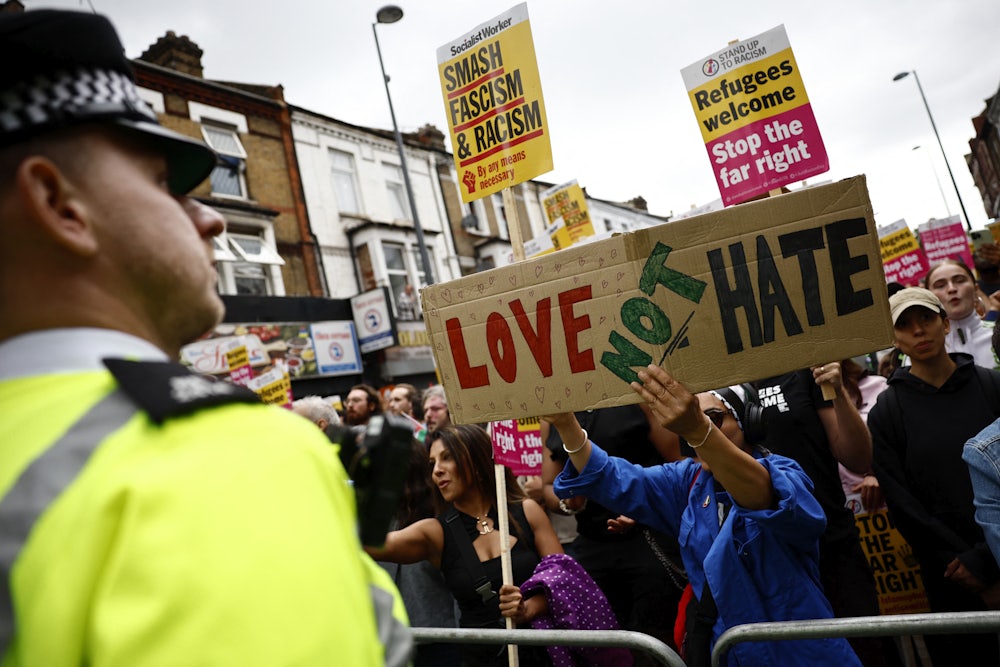On Wednesday, a hit list was circulating Britain. Thirty-nine addresses: refugee centers, the offices of immigration lawyers, advice bureaus, a Border Force post. Targets spanned the whole country, from Sunderland to Hastings. Windows were boarded up, doctors canceled appointments. “Mask up,” instructed the list’s author. “Wednesday night … 8PM. They won’t stop coming until we tell them. NO MORE IMMIGRATION.”
For a week, Britain’s fascists (and their fellow travelers) had been having it all their own way. Brickbats, burning trash bins, bottled cops, firebombs. Last Sunday, a 700-strong mob laid siege to a Holiday Inn near Rotherham in South Yorkshire used as emergency housing for asylum-seekers. Two hundred and fifty people were inside. The mob smashed windows, charged a thin line of police, then tried to set the building on fire. More troublemakers tried to do the same to a hotel in Tamworth, near Birmingham. In several dozen towns and cities, more riots, more looting, more burning tires in the street. Anyone who looked vaguely nonwhite near a zone of conflict risked a kicking. The accelerants have been cheap cocaine, racial rancor, and the rabble’s own success.
Yet Wednesday night came, 8 o’clock passed, and: nothing. What was supposed to be a nationwide street battle became instead a show of domination by a temporary alliance of police and thousands of anti-fascists. Keir Starmer, the prime minister, called up a “standing army” of 6,000 officers to put on their riot gear, while thousands more locals demonstrated in force. “Far-Right protests thwarted,” conceded the front page of the Daily Mail, one of the leading stokers of racist ferment. “Anti-hate marchers faced down the thugs.” Few mourned the cowardice of the thugs, outnumbered and—if it came to a fight—outgunned. Against the worst sustained wave of street violence in Britain by the hard right since the 1980s, the better part of the population proved that the old formula is best: not to hide in fright or flee but to confront the fascists where they stand in a demonstration of unity.
The far right’s rampage was born of a falsehood. On July 29, an attacker with a knife killed three children in the northern town of Southport, gravely wounding seven others. Stirred by a rumor the assailant was a migrant, or Muslim, or an asylum-seeker, a hooligan squad converged the next evening near the scene and fought with police. To dispel the rumor and deflate the mob, authorities broke their own rule of not publicly naming suspects if they are minors. Naming him did not work.
Newer, more organized fascist units like Patriotic Alternative and Britain First—which the previous government considered including under its definition of “extremists”—were not at the forefront. The rioters were instead a looser lot, priming themselves on WhatsApp Groups, X networks, and forums on the unregulated messenger service Telegram. Coalitions derived from the internet alone do not survive long; a sustained week of action was probably the full depth of their potential. The bulk are football ultras and lumpens in towns left spent by the death march of deindustrialization and Tory austerity, who would be classed as “downwardly mobile” if there were someplace further for them to fall. They are the locals at the riots because they can’t afford the price of a train ticket to riot anywhere else. But the petit bourgeois of the rabble can. These are the personal trainers, the crypto obsessives, and heirs to the family plumbing business who believe themselves to be in a much more precarious place and blame migrants for putting them there.
Far above, the figureheads. Failed actor and most-divorced-man-alive Laurence Fox (“Islam needs to be removed from Britain. Completely and entirely”), woman-hating fruitloop Andrew Tate (“It’s dangerous to be white”), and Nigel Farage, whose Reform Party placed second to Labor in 98 seats at July’s election. A teenager during the last serious era of fascist organizing, Farage used to be very tickled that he shared initials with the National Front, and in the halls of Dulwich College used to chant those of the British (National Socialist) Movement: “B.M., B.M., we are British Nazi men.” He can’t be quite so honest anymore; on the day after the first wave in Southport he instead suggested, “The truth is being withheld from us.” The violence in Britain this week has been intimate, rough, invasive. Its provocateurs are far away.
The particular horror of the Southport stabbings prodded a treasured grievance of the hard right. A decade ago, nine members of a child-rape gang in Rochdale, near Manchester, were jailed. Later investigations convicted 42 others. Most were of South Asian origin; their victims hundreds of poor white girls. Catastrophic police negligence allowed the abuse to continue, but against the background static of the “war on terror” and the spree of blood that came with the rise of ISIS, a vision of Muslims as barbarous, alien, and violating congealed. Its initial expression came in the form of the English Defense League, helmed by former tanning salon owner Tommy Robinson. The EDL is kaput now, Robinson alternating between court appearances and stints at holiday resorts on the dime of his duped and feral audience. But the alignment of that era has been bolstered by the new reach of social media, and it is regurgitating old slogans. Ubiquitous this week alongside the usual “Enough is enough” and “Stop the boats” was the common cry of “Save our kids.”
Enough of what? The fascist thinks himself part of a subject population under foreign occupation. The takeover, he reckons, is run from London by its mayor, Sadiq Kahn, and backed by the BBC’s propaganda of “diversity” and “multiculturalism.” The police, traditionally the fascist’s friends, do the work of a captured government by arresting people for making posts on Facebook. The properly committed (in the sense of an insane asylum) think the chain goes one higher: “The Jews” are also involved. Second World War fantasies run alongside fears of infiltration and the kind of craniometry found in “great replacement theory.” Here the malign neglect of the austerity era (which never ended) meets the mass paranoid dreams only social media can breed; real alienation finds its vengeful outlet not in the rioters’ actual dispossessors, but in the minorities destroying a “way of life” that none of them are bright enough to remember.
A lot of breath will be wasted by anyone who identifies “disinformation” as the cause and culprit, as if the mob were set to frenzy like a rabid dog near water by a Russian bot. They did not go to the street for a lie. They did not risk spending the next 10 years in the slammer for a lie. They went, many with intent to murder, because the warlike and paranoiac tenor of their feeds told them the lie was plausible. A vast architecture of corrosive belief props up the choice to tag “Move them out or we burn them out” on a wall or indeed to actually set fire to a migrant hostel. An ideology built entirely on the total language of domination, invasion, and replacement only spurs retaliation in kind. Fact-checking and passing out more Pinocchios-per-fib was proved not to move any needles during the Trump administration; a fresh dose of hectoring will not send the fascists back home for a cup of tea and some quiet meditation on their sins.
Nor can we rely on the cops alone. Keir Starmer, Labor’s new prime minister, thinks he can, leaning back into the style of his old job as a prosecutor. “Thuggery,” he calls it: a criminal matter. More than 400 arrests have already been made, work simplified by the modern habit of livestreaming everything. Those videos delivered the other consolation of the week: footage of a rioter getting two missiles to the head from his own side while gyrating in front of a police line, then a final accurate shot to the balls. Justice does not always need the law.
If in the self-glorification of his persona as a dutiful civil servant Starmer forgets that he is also a politician with a coalition to defend, he and his party leave the field open for the fascists to have another go, only next time with the unifying experience of prison time. Police repression is only half a strategy, as Wednesday night showed. The other is a serious and fierce countermobilization in defense of the vulnerable and a furious political argument for why the vulnerable are worth protecting.






